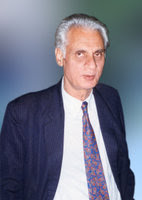Omkar N. Koul
It is not easy to write an obituary of a person who has been associated with you for long; belonging to same academic fraternity- teaching, research and administration; and above all a trusted friend. We were classmates both in college as well as university for four years (1959-1963); we were in a sort of competition both in studies as well as in co-curricular activities. In college, both of us were elected to a literary club. He joined NSS (the opportunity I missed). He acted in a college play, and I worked behind the stage. We participated in literary activities in and outside the college/university.
He had an edge over me in several matters. In studies, he did better than me. He got the first rank in masters degree in the university. He got a job in the university and I left the valley for pursuing higher studies. Though living in distant places, we kept a track of each other. He kept working at the University of Kashmir holding different positions, and I had to change places and institutions: Agra (K M Institute), Urbana (University of Illinois), Patiala (Northern Regional Language Centre), Mussoorie (LBS National Academy of Administration), and Mysore ( Central Institute of Indian Languages). He was forced to move to Jammu as a result of political disturbances in the valley in 1990. Both of us retired from the positions we were holding in the same year. He settled in Jammu, and I moved to Delhi after retirement in 2001.
He is the first person to be awarded a D. Litt degree by the University of Kashmir. I was one of his examiners. His viva-voce examination was delayed by the university. His wife died of cancer. This was a big turn in his life. He could not come over this loss for long. He had to live alone in his house in Barnai, Jammu. He named his house parn kutir (a grass cottage) which ultimately turned out to be a place where he dedicated his day and night to writing.
There was a major turn in his academic activities. He had been a teacher of Hindi literature throughout and held different positions (from lecturer to professor) and headed the Post-Graduate Department of Hindi too. While in job, he had occasionally written and published papers in Hindi related to Kashmiri literature and culture.
The political events which resulted in mass exodus of Kashmiri Pandits to Jammu and other places in India and abroad, had a great impact on the whole Kashmiri Pandit community. The displaced persons from the valley started feeling cultural rootlessness in an alien environment. A large number of intellectuals, professionals, teachers and students took to activities pertaining to Kashmiri language, literature or culture. There was a boost in literary activities all around. Besides writing in Hindi, Bhushan Lal Kaul started writing in Kashmiri. As he had not published any book earlier, he asked me to write a foreword to his first two books: visthaapan ka sahitya (in Hindi) and Arzath (in Kashmiri). As a long-time friend, I was very hesitant to do so, but when he insisted I could not decline. I was highly impressed by his literary style in Kashmiri and his command over the language. I am glad both of his books were well-received. The book in Kashmiri got him the highest award of the J&K Academy of Art, Culture and Languages.
His other books in Kashmiri namely Vemarsh, Praznath etc. followed one after the other. After earning a name and respect in the literary world pertaining to Kashmiri, he was requested by a large number of authors, both young and old, to write forewords to their books, reviews, and review articles. He was requested by well-known authors to write review articles related to their works which were released in Jammu and Delhi. He must have written forewords, reviews and articles related to scores of books in Kashmiri and Hindi.
He was not only a prolific prose writer in Kashmiri, he proved to be an excellent orator in Kashmiri. An important activity he got involved in was his participation in various literary, cultural and religious functions and events. He made an enormous contribution by giving pravacans (religious discourses) at the religious and socio-cultural gatherings in temples, ashrams and religious gatherings in Jammu, Delhi and other places. He became a frequent speaker at the Bhagwan Gopinath Ashrams and other places. On his invitation, I attended one such function organsied by Gopinath Ashram in Delhi. I was pleasantly amazed to find out that he could easily capture his audience with his excellent oratory skills including modulation of voice and reciting of verses. He got loud applauses from the audience.
He had become an institution in himself over recent years, and was sought after by literary circles, religious and socio-cultural organisations. He edited Kashmiri section of the Khir Bhawani Times published from Jammu. Besides being associated with a large number of literary organizations, he floated his own organization too.
His sudden demise on February 16, 2009 after a brief illness has left a void in the socio-cultural and literary circles of Jammu which would be difficult to fill in the years to come.
February 20, 2009
Friday, April 3, 2009
Subscribe to:
Posts (Atom)
